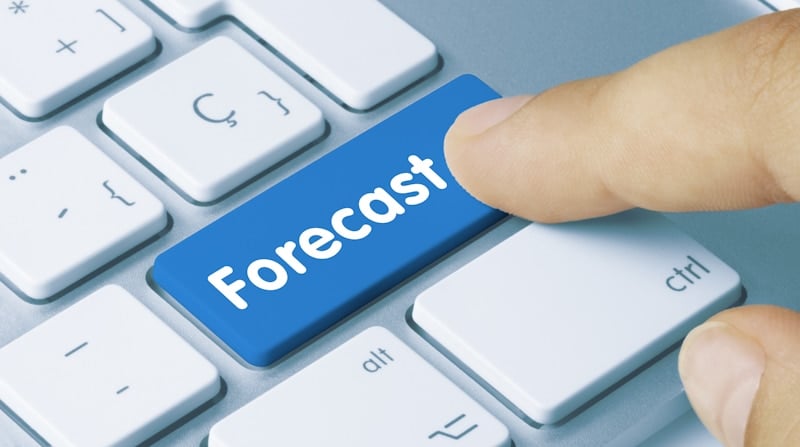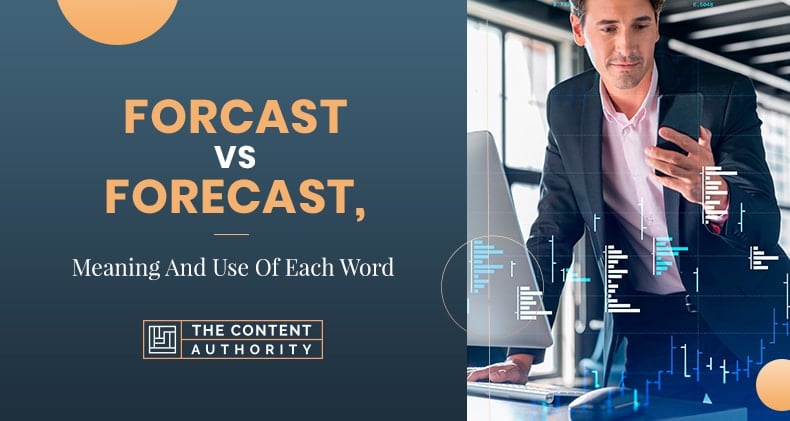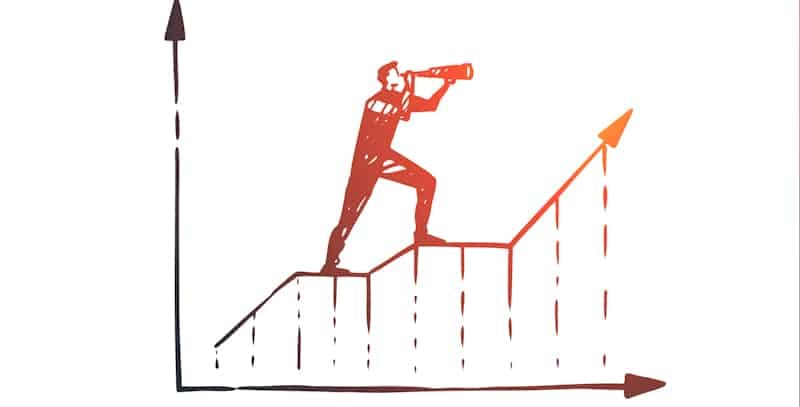A forecast describes when someone analyzes any meteorological data or estimates the future based on predictions. The common term when this happens is “forecasting,” used by a meteorologist on the news or radio. The spelling “forcast” is incorrect.
The primary difference between “forecast” and “forecast” is that we use “forecast” when determining or predicting when something will occur in the future, especially when discussing the weather. The term “forcast,” on the other hand, is known for being out of date and no longer in use.
In this article, we’ll look at the most common uses of the accurate word forecast and how to use it correctly depending on the situation.

Forecast Meaning
When talking, it is common to find ourselves getting confused about each word’s proper writing, especially when the spelling is so similar.
Forecast is a verb that evaluates future possibilities, explaining it to an audience with all the variations and answers attached to it. It is important not to confuse this term with ‘projections’ since it differs from the intention of the forecast.
As previously stated, because the word forecast is primarily based on predictable outcomes or most likely scenarios, projection only allows for a more theoretical suggestion that will be used in what-if scenarios. Depending on the results, forecasts are more likely to occur.
However, a very challenging action when forecasting is finding the correct number of events that have happened in the past that should be considered before making any predictions for the immediate or distant future.
This action adds a lot of importance because sometimes it helps the other person maintain hope, informed business decisions, and new strategies in life. Additionally, it will add new patterns and changes.
Predictions could also be misused as forecasts. But predictions are a more precise declaration about when or where something will happen. In contrast, a forecast is a simple guess based on probabilistic statements that occurred in the past.
When To Use The Term “Forecast”?
Depending on the scenario, “forecast” will be implemented differently. For example, the people who explain or predict the week’s weather are known for doing a forecast to obtain the proper results. This is mainly made by gathering a number of data about the current state of the atmosphere in a specific area. When this happens, they use meteorology to show how the climate could be affected by these changes.
To predict any climate change in less than 5 minutes, forecasters will compare the recent information with the current results obtained on the day. Some factors are not considered because the weather, in this case, will not be affected significantly.
“Forecast” means a branch of statistics to implement in the current situation or method. We also use it to estimate and predict the direction of everyday scenarios. However, these scenarios may depend on various factors like the relevance and availability of the historical data obtained from the past. Also, how much time, cost, or value was input into this initial prediction for it to be legitimate.
In view of the fact that forecasts are based on very unpredictable guests, these factors need to be considered frequently because many changes could occur during the forecast period. For this reason, those who make forecasts should be careful to use methods that take the most advantage of the data available. Similarly, they should aim to make these predictions as accurate and near to reality as possible.
In business, this term is utilized when referring to how they plan to distribute their funds or budget for any expenses that could come beforehand for a determined period of time. This is commonly based on the calculations they have for the goods and services provided. As a result, the company creates a plan based on what happened the previous year and looks for upcoming events that may be harmful to the business in the future.
Studies like this include determining if retail prices will rise or fall over the season or analyze sales expectations. When companies have a long-term preparation for any plan, it is important to have a good forecast on the table.
Moreover, if the implied business or future method demands a precise answer for any suggestions, they will take into consideration the degree cycle from which this forecast is made. Because this information will help determine the stage of a prime predictor forecasting method that will be used.
Forcast Meaning
This word has become obsolete and is no longer in use. It is well-known for being a misspelled word deriving from the term forecast. The difference is that “forcast” was used to explain why something was rejected or cast away.
In older times, the term “forcast” or cast away referred to when a person who was not accepted in society or a group of people was ignored or put aside. The same definition was implemented for any activity a person chose to discard, such as reading books, having a hobby, or simply rejecting a possibility when given one. The term “forcast” aligned with all of these situations.
However, this is no longer being implemented in modern society. We can’t find a proper definition of this word without having it autocorrected for the correct word, forecast.
Other Word Usage Posts
Related definitions of “Forecast”
Throughout this article, we used the term “forecasting,” which, as previously stated, is also related to the word “forcast.”
Forecasting is the process that investigates a fundamental estimation from the past in relation to a current trend or behavior patterns. This is used to anticipate what type of situation could change in the future and cause it to vary from previous values. A prediction is similar to forecasting in that it concentrates on general results rather than a specific one.
A forecasting person will address the issue directly based on the information obtained from the past. It will study it very precisely to make the results as most accurate as possible. This is because it could damage the answer and affect the area that is being investigated. Based on the results, the information is used and manipulated to match or implement the current ones.
After this verification process is completed, a confirmation and validation period occurs where the forecast contrasts the evidence obtained from past data and makes it more accurate for forecasting in the future.
They will only try to draw a picture of what the future might look like based on the outcomes or whether or not it will affect them. However, depending on the intention of some companies, this technique could be refined to extract detailed information from all past events.
Conclusion
Sometimes taking a risk will help in forecasting because it is considered good practice to indicate that a particular level of uncertainty will help the data be organized.
However, forecasting is extremely difficult. Because it forces you to be very specific about the answers you seek, and the margin for error is minimal. Climate changes, for example, are difficult to forecast because the weather can change within five minutes. Nevertheless, next time, when you have a gut feeling and search for the correct phrase to describe it in front of your friends or family, you can use a forecast to predict the future.
Shawn Manaher is the founder and CEO of The Content Authority. He’s one part content manager, one part writing ninja organizer, and two parts leader of top content creators. You don’t even want to know what he calls pancakes.



